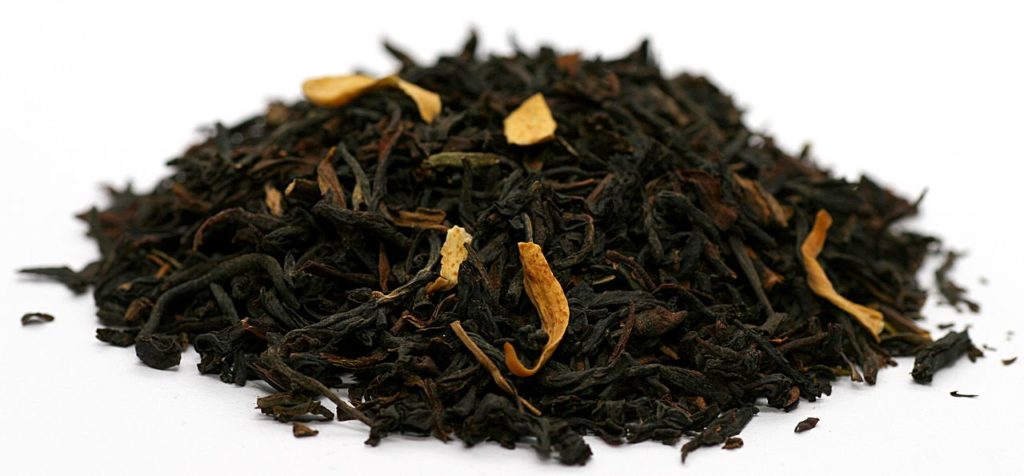
I learned this today. Earl Grey tea is supposed to have been named after Charles Grey, 2nd Earl Grey, prime minister of Britain from 1830 to 1834, but it is more likely that this story was invented for advertising purposes and the tea is actually named after William Grey & Co. tea merchant.
Earl Grey tea is probably one of the most famous types of tea, but it is not actually a specific type of tea leaf. Earl Grey tea is a flavored tea. Originally it is a blend of tea leaves flavored with oil of bergamot. Bergamot is a type of orange that is very fragrant. It looks like a large lime and tastes less sour than a lemon but more bitter than a grapefruit. After the tea leaves are oxidized, the bergamot oil is either sprayed over the leaves, or pieces of dried bergamot orange are added to the leaves. The spraying results in a stronger flavor because all of the leaves are coated in the oil.
Earl Grey himself lived from 1764 to 1845 in Britain. His government brought about the Reform Act of 1832, which reformed parliament, and the Slavery Abolition Act of 1833, which abolished slavery in most of the British Empire. However, he is not known for or remembered for these important things. He is remembered for the tea, or, rather, he is not remembered at all.
The reason why the tea is called Earl Grey tea cannot be proven. The most common story is that it was named after Charles Grey, 2nd Earl Grey. However, it could just as likely have been a concocted story.
The most commonly used story of the tea’s creation is that Prime Minister Charles Grey sent an envoy to China. The envoy saved a drowning Chinese mandarin’s son, and the Chinese mandarin sent the gift of tea to Earl Grey. That is the story. However, China was diplomatically closed at this time, so it was unlikely an envoy would have been there. Also, bergamot orange is not found in China. People counter this by saying that the bergamot was introduced to replace a similar flavor that is found in China.
A more likely origin story is that the “Earl” was added to give the tea a sense of respectability and to help it sell.
In 1852, William Grey & Co. was selling “Grey’s tea”. This was shortened to simply “Grey”. His tea warehouse was very close to the family seat of the Earl Grey. Shortly after that William Grey & Co. disappeared and Charlton & Co., London tea blenders, started selling “The Celebrated Grey Mixture”. It is doubtful that this is a coincidence. By 1884, they are still selling the same tea, but the name has changed to “Earl Grey’s Mixture”. Charlton’s say that they are the sole proprietors of this tea.
These days, many people associate Earl Grey’s tea with the upper classes, so adding the “Earl” to the name was probably an attempt to raise the status of the tea. It seems to have worked.
The honor of being the first to make Earl Grey tea is claimed by two London tea merchants. Twining’s of the Strand and Jackson’s of Piccadilly. Neither of them has any verifiable proof. Twining’s say that the Earl asked them to make the tea for him, and they have sold it ever since. They managed to get the 6th Earl to say that their version is true, but they don’t have any proof from the time. Jackson’s say that Earl Grey gave the recipe to George Charlton, who became a partner of Robert Jackson & Co. in 1830. Both of these stories could be true and neither of them.
So, looking at the available evidence, it seems that Earl Grey tea was first made by a man called William Grey who was selling tea close to where Earl Grey lived. He may have then passed the recipe to a man called George Charlton, who continued selling the tea in London, calling it “Grey’s mixture”. George Charlton may then have added the title “Earl” to make the tea sound more upper class and increase sales. The name may then have stuck. There is no evidence that Earl Grey at the time had anything to do with it and only succeeding Earls Grey have claimed this version of the story. And that is what I learned today.
Sources
https://en.wikipedia.org/wiki/Earl_Grey_tea
https://en.wikipedia.org/wiki/Bergamot_orange
http://www.foodsofengland.co.uk/earlgreytea.htm
http://www.historyhome.co.uk/pms/grey.htm
https://en.wikipedia.org/wiki/Charles_Grey,_2nd_Earl_Grey#Prime_minister_(1830%E2%80%931834)
https://www.teacupsfull.com/blogs/blog/the-history-of-earl-grey-tea
